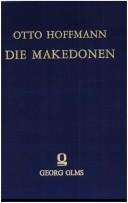| Listing 1 - 5 of 5 |
Sort by
|

ISBN: 348705292X 9783487052922 Year: 1974 Publisher: Hildesheim, New York : Olms,
Abstract | Keywords | Export | Availability | Bookmark
 Loading...
Loading...Choose an application
- Reference Manager
- EndNote
- RefWorks (Direct export to RefWorks)
Macedonians (Ancient) --- Macédoniens --- Macedonian language (Ancient) --- Macédoniens
Book
ISBN: 9781905125982 1905125984 Year: 2015 Publisher: Swansea The Classical Press of Wales
Abstract | Keywords | Export | Availability | Bookmark
 Loading...
Loading...Choose an application
- Reference Manager
- EndNote
- RefWorks (Direct export to RefWorks)
Macedonians (Ancient) --- Kings and rulers, Ancient --- Macédoniens --- Rois et souverains anciens --- Macedonia --- History --- Politics and government. --- Macédoniens

ISBN: 9607094867 Year: 1994 Volume: 19. Publisher: Athènes : Paris : Centre de recherches de l'antiquité grecque et romaine Diffusion de Boccard,
Abstract | Keywords | Export | Availability | Bookmark
 Loading...
Loading...Choose an application
- Reference Manager
- EndNote
- RefWorks (Direct export to RefWorks)
Initiation rites --- Macedonians (Ancient) --- Cults --- Inscriptions, Greek --- Rites d'initiation --- Macédoniens --- Cultes --- Inscriptions grecques --- Social life and customs --- Moeurs et coutumes --- Macedonia --- Macédoine --- Religion. --- Religion --- -Macedon --- -Religion --- Makedhonia --- Makedonia --- Makedoniya --- Makedonja --- Macédoniens --- Macédoine --- Macedon --- Jeunesse --- Antiquité --- Éducation
Book
ISBN: 9782884744072 288474407X Year: 2008 Volume: 19 Publisher: Gollion : Infolio ;
Abstract | Keywords | Export | Availability | Bookmark
 Loading...
Loading...Choose an application
- Reference Manager
- EndNote
- RefWorks (Direct export to RefWorks)
Tombs --- Grave goods --- Macedonians (Ancient) --- Tombes --- Mobilier funéraire --- Macédoniens --- Funeral customs and rites --- Rites et cérémonies funéraires --- Mobilier funéraire --- Macédoniens --- Rites et cérémonies funéraires --- Inhumation --- Burial --- Fouilles archéologiques. --- Excavations (Archaeology) --- Rites et cérémonies funéraires. --- Mourning customs --- Érétrie (Grèce)
Book
ISBN: 9780415735513 9781315771809 Year: 2014 Publisher: Milton Park, Abingdon, Oxon : Routledge,
Abstract | Keywords | Export | Availability | Bookmark
 Loading...
Loading...Choose an application
- Reference Manager
- EndNote
- RefWorks (Direct export to RefWorks)
"Late Classical and Early Hellenistic Corinth, 338-196 B.C. challenges the perception that the Macedonians' advent and continued presence in Corinth amounted to a loss of significance and autonomy. Immediately after Chaironeia, Philip II and his son Alexander III established close relations with Corinth and certain leading citizens on the basis of goodwill (eunoia). Mutual benefits and respect characterized their discourse throughout the remainder of the early Hellenistic period; this was neither a period of domination or decline, nor one in which the Macedonians deprived Corinthians of their autonomy. Instead, Corinth flourished while the Macedonians possessed the city. It was the site of a vast building program, much of which must be construed as the direct result of Macedonian patronage, evidence suggests strongly that those Corinthians who supported the Macedonians enjoyed great prosperity under them. Corinth's strategic location made it an integral part of the Macedonians' strategy to establish and maintain hegemony over the mainland Greek peninsula after Philip II's victory at Chaironeia. The Macedonian dynasts and kings who later possessed Corinth also valued its strategic position, and they regarded it as an essential component in their efforts to claim legitimacy due to its association with the Argead kings, Philip II and Alexander III the Great, and the League of Corinth they established. This study explicates the nature of the relationship between Corinthians and Macedonians that developed in the aftermath of Chaironeia, through the defeat at the battle of Kynoskephalai and the declaration of Greek Freedom at Isthmia in 196 B.C. Late Classical and Early Hellenistic Corinth is not simply the history of a single polis; it draws upon the extant literary, epigraphic, prosopographic, topographic, numismatic, architectural, and archaeological evidence to place Corinth within broader Hellenistic world. This volume, the full first treatment of the city in this period, contributes significantly to the growing body of scholarly literature focusing on the Hellenistic world and is a crucial resource for specialists in late Classical and early Hellenistic history"--
Macedonians --- Macédoniens --- History. --- Histoire --- Corinth (Greece) --- Corinth (Greece) --- Corinth (Greece) --- Macedonia --- Macedonia --- Corinth (Greece) --- Greece --- Corinthe (Grèce) --- Corinthe (Grèce) --- Corinthe (Grèce) --- Macédoine --- Macédoine --- Corinthe (Grèce) --- Grèce --- Civilization. --- History. --- Relations --- Relations --- Kings and rulers --- History --- Antiquities. --- History --- Civilisation --- Histoire --- Relations --- Relations --- Rois et souverains --- Histoire --- Antiquités --- Histoire
| Listing 1 - 5 of 5 |
Sort by
|

 Search
Search Feedback
Feedback About
About Help
Help News
News